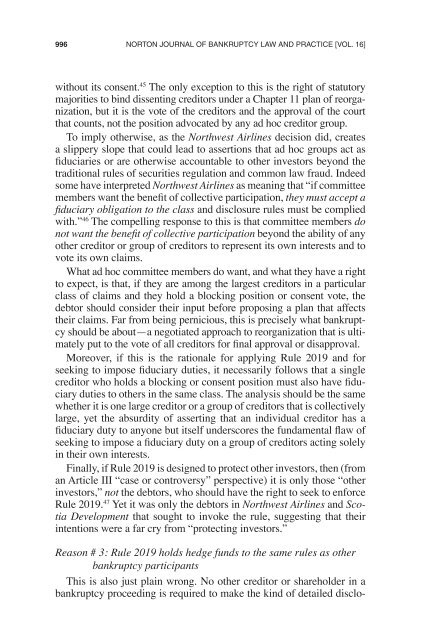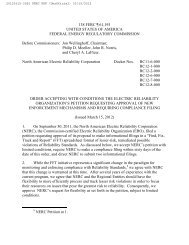Ad Hoc Committees and the Misuse of Bankruptcy Rule 2019
Ad Hoc Committees and the Misuse of Bankruptcy Rule 2019
Ad Hoc Committees and the Misuse of Bankruptcy Rule 2019
Create successful ePaper yourself
Turn your PDF publications into a flip-book with our unique Google optimized e-Paper software.
996 Norton Journal <strong>of</strong> <strong>Bankruptcy</strong> Law <strong>and</strong> Practice [Vol. 16]<br />
without its consent. 45 The only exception to this is <strong>the</strong> right <strong>of</strong> statutory<br />
majorities to bind dissenting creditors under a Chapter 11 plan <strong>of</strong> reorganization,<br />
but it is <strong>the</strong> vote <strong>of</strong> <strong>the</strong> creditors <strong>and</strong> <strong>the</strong> approval <strong>of</strong> <strong>the</strong> court<br />
that counts, not <strong>the</strong> position advocated by any ad hoc creditor group.<br />
To imply o<strong>the</strong>rwise, as <strong>the</strong> Northwest Airlines decision did, creates<br />
a slippery slope that could lead to assertions that ad hoc groups act as<br />
fiduciaries or are o<strong>the</strong>rwise accountable to o<strong>the</strong>r investors beyond <strong>the</strong><br />
traditional rules <strong>of</strong> securities regulation <strong>and</strong> common law fraud. Indeed<br />
some have interpreted Northwest Airlines as meaning that “if committee<br />
members want <strong>the</strong> benefit <strong>of</strong> collective participation, <strong>the</strong>y must accept a<br />
fiduciary obligation to <strong>the</strong> class <strong>and</strong> disclosure rules must be complied<br />
with.” 46 The compelling response to this is that committee members do<br />
not want <strong>the</strong> benefit <strong>of</strong> collective participation beyond <strong>the</strong> ability <strong>of</strong> any<br />
o<strong>the</strong>r creditor or group <strong>of</strong> creditors to represent its own interests <strong>and</strong> to<br />
vote its own claims.<br />
What ad hoc committee members do want, <strong>and</strong> what <strong>the</strong>y have a right<br />
to expect, is that, if <strong>the</strong>y are among <strong>the</strong> largest creditors in a particular<br />
class <strong>of</strong> claims <strong>and</strong> <strong>the</strong>y hold a blocking position or consent vote, <strong>the</strong><br />
debtor should consider <strong>the</strong>ir input before proposing a plan that affects<br />
<strong>the</strong>ir claims. Far from being pernicious, this is precisely what bankruptcy<br />
should be about—a negotiated approach to reorganization that is ultimately<br />
put to <strong>the</strong> vote <strong>of</strong> all creditors for final approval or disapproval.<br />
Moreover, if this is <strong>the</strong> rationale for applying <strong>Rule</strong> <strong>2019</strong> <strong>and</strong> for<br />
seeking to impose fiduciary duties, it necessarily follows that a single<br />
creditor who holds a blocking or consent position must also have fiduciary<br />
duties to o<strong>the</strong>rs in <strong>the</strong> same class. The analysis should be <strong>the</strong> same<br />
whe<strong>the</strong>r it is one large creditor or a group <strong>of</strong> creditors that is collectively<br />
large, yet <strong>the</strong> absurdity <strong>of</strong> asserting that an individual creditor has a<br />
fiduciary duty to anyone but itself underscores <strong>the</strong> fundamental flaw <strong>of</strong><br />
seeking to impose a fiduciary duty on a group <strong>of</strong> creditors acting solely<br />
in <strong>the</strong>ir own interests.<br />
Finally, if <strong>Rule</strong> <strong>2019</strong> is designed to protect o<strong>the</strong>r investors, <strong>the</strong>n (from<br />
an Article III “case or controversy” perspective) it is only those “o<strong>the</strong>r<br />
investors,” not <strong>the</strong> debtors, who should have <strong>the</strong> right to seek to enforce<br />
<strong>Rule</strong> <strong>2019</strong>. 47 Yet it was only <strong>the</strong> debtors in Northwest Airlines <strong>and</strong> Scotia<br />
Development that sought to invoke <strong>the</strong> rule, suggesting that <strong>the</strong>ir<br />
intentions were a far cry from “protecting investors.”<br />
Reason # 3: <strong>Rule</strong> <strong>2019</strong> holds hedge funds to <strong>the</strong> same rules as o<strong>the</strong>r<br />
bankruptcy participants<br />
This is also just plain wrong. No o<strong>the</strong>r creditor or shareholder in a<br />
bankruptcy proceeding is required to make <strong>the</strong> kind <strong>of</strong> detailed disclo-



